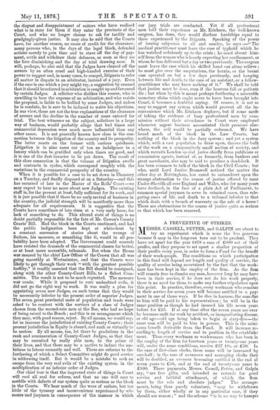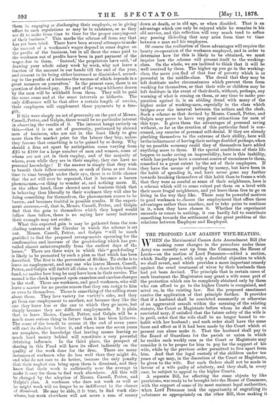A PREVENTIVE OF STRIKES.
MESSRS. CASSELL, PETTER, and GALPIN are about to try an experiment which is none the less generous because it may in the long-run turn out to be prudent. They have set apart for the year 1878 a sum of £600 out of their profits, and they propose to set apart a similar proportion of their profits every year, in order to form a Fund for the benefit of their work-people. The conditions on which participation in this fund will depend are length and quality of service, the quality of service being ascertained by the fact that the work= man has been kept in the employ of the firm. As the firm will remain free to dismiss any man, however long he may hate been in their service, if he does not do his work properly, there is no need for them to make any further stipulation upon this point. In practice, therefore, every workman who remain& in their service for seven years will become entitled to a pay= ment in one of three ways. If he dies in harness, the sum dub to him will be paid to his representatives ; he will be in the same position as though he had insured his life seven years before for £25. If at any time after the seven years are over he becomes unfit for work by accident, or incapacitating disease, or old age—old age being taken to begin at sixty-five—the same sum will be paid to him in person. This is the mini- mum benefit derivable from the Fund. It will increase ac- cording to length of service and to position in the establish=" ment. Thus every workman or workwoman who has been in the employ of the firm for fourteen years or twenty-one years will, under the same conditions, receive £37 10s. or £50. In the case of first-class clerks, these sums will be increased-by one-half ; in the case of overseers and managing clerks they will be doubled, an overseer becoming entitled at the end of seven years to £50, and at the end of twenty-one years to £100. These payments, Messrs. Cassell, Petter, and Galvin say, "are free gifts, and intended as rewards for good service and faithful attachment, of which the firma must be the sole and absolute judges." The arrange ments, being thus purely voluntary, "may be withdrawn by them, either wholly or in any particular case, if they should see reason ; " and the scheme "is in no way to hamper them in engaging or discharging their employs, or in giving effect to such regulations as may be in existence, OF as they see fit to make from time to time for the proper carrying-out of their business." This marks the scheme off from any that has yet been tried. There have been several attempts to make the amount of a workman's wages depend in some degree on the profits of the business, but in all these the sums paid to the workmen out of profits have been in part payment of the wages due to them. Instead,' the proprietors have said, of drawing your whole salary week by week, why not leave a fraction of the amount in our hands till the end of the year, and consent to its being either increased or diminished, accord- ing to the profits of a business the success of which depends in a great measure on yourselves.' In the present case, there is no question of deferred pay. No part of the wages hitherto drawn by the men will be withheld from them. They will be paid the same sums and at the same intervals as hitherto. The only difference will be that after a certain length of service, their employers will supplement these payments by a free- gift. If this were simply an act of generosity on the part of Messrs. Cassell, Petter, and Galpin, there would be no particular interest in observing the results of it. The interest hangs entirely on this,—that it is an act of generosity, performed by shrewd men of business, who are not in the least likely to give more than the market price for the labour they buy, unless they foresee that something is to be gained by so doing. Why should a firm set apart by anticipation sums varying from £25 to £100 for a large number of men and women, some of whom are not yet in their employ, and of the majority of whom, even while they are in their employ, they can have no personal knowledge ? If the answer is simply that they wish to benefit their fellow-creatures, or such of them as are from time to time brought under their eye, there is so little chance that the act will ever be repeated, that it becomes a barren phenomenon,—a thing to wonder at, and nothing more. If, on the other hand, these shrewd men of business think that in behaving thus liberally to their workmen they will also be doing something for themselves, the phenomenon ceases to be barren, and becomes fruitful in possible results. If the experi- ment answers,--if, that is, Messrs. Cassell, Petter, and Galpin find that the gain to themselves which they hoped would follow does follow, there is no saying how many imitators their example may not evoke. What this expected gain is may be gathered from the con- cluding sentence of the Circular in which the scheme is set out. Messrs. Cassell, Petter, and Galpin "will be much gratified to find the proposed arrangements operating for the confirmation and increase of the good-feeling which has pre- vailed almost uninterruptedly from the earliest days of the house." There are three ways in which this " good-feeling" is likely to be promoted by such a plan as that which has been described. The first is the prevention of Strikes. To strike is to leave an employment, and any one who leaves Messrs. Cassell, Petter, and Galpin will forfeit all claim to a share in this benefit fund, no matter how long he may have been in their service. The second is the check imposed upon causeless and careless changes in the staff. There are workmen, and good workmen, who will leave a master for no precise reason that they can assign to him or even to themselves. There is something of the rolling stone about them. They love variety for variety's sake, and they go from one employment to another, not because they like the one they leave less or the one to which they go more, but simply because they are different employments. It is plain that to leave Messrs. Cassell, Petter, and Galpin will be a much more serious thing in future than it has been hitherto. The sense of the benefit to accrue at the end of seven years will cast its shadow before it, and when once the seven years are complete, the knowledge that leaving means leaving so much hard money behind will constitute a very powerful detaining influence. In the third place, the prospect of sharing in this Fund will have its effect indirectly on the quality of the work done for the firm. There are many instances of workmen who do less well than they might do, and who do not care to do better, because the only penalty that their neglect can bring upon them is dismissal, and they know that their work is sufficiently near the average to make it easy for them to find work elsewhere. All this will be changed by the adoption of Messrs. Cassell, Petter, and Galpin's plan. A workman who does not work as well as he might work will no longer be so indifferent to the chance of dismissal. He may be able, it is true, to find work else- where, but work elsewhere will not mean a sum of money down at death, or in old age, or when disabled. That is an advantage which can only be enjoyed while he remains in his old service, and this reflection will very much tend to soften any passing ill-feeling that may arise from time to time between a man and his employers.
Of course the realisation of these advantages will require the hearty co-operation of the workmen employed, and in order to determine how far this is likely to be obtained, we must inquire how the scheme will present itself to the working- class. On the whole, we are inclined to think that it will be well received by them. The higher up you go in the working- class, the more you find of that fear of poverty which is so powerful in the middle-class. The dread that they may be left destitute under circumstances which prevent them from working for themselves, or that their wife or children may be left destitute in the event of their death, without, perhaps, any warning of what is coming on them, or any time to make pre- paration against it, is an abiding dread with many of the higher order of working-men, especially in the class which bridges over the interval between the artisan and the clerk. Such a scheme as that devised by Messrs. Cassell, Petter, and Galpin may prove to have very great attractions for men of this type. It gives them the advantages of personal saving without, so far as the creation of this particular fund is con- cerned, any exercise of personal self-denial. If they are already pinching themselves to the extreme of their ability, here will be the inducement of having their savings doubled perhaps, when by no possible economy could they of themselves have added anything more to them. If the special conditions of their life happen to make saving an impossibility, here is this inability, which has perhaps been a constant source of uneasiness to them, remedied to a great extent by the act of their employers. If they have the means of putting by money, but have been in the habit of spending it, and have never gone any further towards breaking themselves of this habit than to frame a wish that they were as careful as some of their neighbours, here is a scheme which will to some extent put them on a level with their more frugal neighbours, and yet leave them free to go on living in the way they like. These may be powerful motives to good workmen to.choose the employment that offers these advantages rather than another, and to take pains to continue in it, when they have chosen it. Whether the experiment succeeds or comes to nothing, it can hardly fail to contribute something towards the settlement of the great problem of the relations between Employer and Employed.







































 Previous page
Previous page